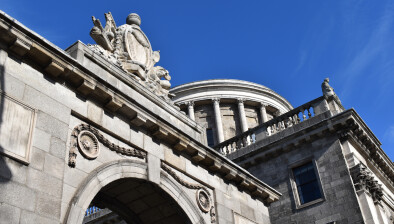Supreme Court: Current citizenship revocation regime unconstitutional

Andrew McKeown BL
The Supreme Court has held that the current statutory procedure for the revocation of naturalised citizenship is unconstitutional.

About this case:
- Citation:[2020] IESC 63
- Judgment:
- Court:Supreme Court
- Judge:Ms Justice Elizabeth Dunne
Ms Justice Elizabeth Dunne held that there were insufficient safeguards contained in the Irish Nationality and Citizenship Act 1956 s.19.
Background
The appeal was taken by Ali Charaf Damache, a naturalised Irish citizen currently serving a 15-year sentence in the US related to assisting a terrorist conspiracy. He pleaded guilty in a federal court in Philadelphia in July 2018 to a charge that, while resident in Ireland he materially assisted an Islamist terrorist conspiracy. In October 2018, the Minister for Justice and Equality informed Mr Damache of his intention to revoke his Irish citizenship.
The appeal related to the procedure for the revocation of Irish citizenship. Article 9.1.2 of the Constitution provides that the acquisition and loss of Irish nationality and citizenship “shall be determined in accordance with law”. The Irish Nationality and Citizenship Act 1956 S.19(2) and (3) provides for the process to be followed after a Minister has formed an intention to revoke citizenship. Generally, if the intention to revoke is opposed by a person subject to the intended revocation, a committee of inquiry will consider the case. The committee then issues a recommendation upon which the Minister makes his final decision. Mr Damache argued that revocation cannot be fairly ‘adjudicated’ upon by the Minister because he is not a disinterested party by virtue of the fact that he is seeking that very revocation. He said this violates the nemo iudex in causa sua principle.
Mr Damache argued that s.19 is a category of power that can only be exercised lawfully by the Judicial Power. Mr Damache argued that the power to revoke citizenship falls outside the saving provisions in Art.37 of the Constitution, and that, as a result, any conferral of authority onto the Executive Power is unconstitutional.
Mr Damache, the Minister, and the Irish Human Rights and Equality Commission (IHREC), the amicus curiae, referred to Mr Justice John Kenny’s test in McDonald v Bord na gCon [1965] IR 217, that the administration of justice has five characteristics. First, a dispute or controversy as to the existence of legal rights or a violation of the law. Second, the determination or ascertainment of the rights of parties or the imposition of liabilities or the infliction of a penalty. Third, the final determination, subject to appeal, of legal rights or liabilities or the imposition of penalties. Fourth, the enforcement of those rights or liabilities or the imposition of a penalty by the Court or by the executive power of the State which is called in by the Court to enforce its judgment. Fifth, the making of an order by the Court which as a matter of history is an order characteristic of Courts in this country.
Given the drastic consequences of a decision to revoke, it was further argued that any consideration of an application to revoke should require a heightened standard or proof, (Knauer v United States, 328 US 654).
Counsel for Damache referred to Mr Justice Theodore Conyngham Kingsmill Moore’s judgment in In Re Solicitors Act 1954 [1960] IR 239 which dealt with the meaning of ‘limited’ jurisdiction in Article 34.3.4: “The Constitution does not say ‘powers and functions limited in number’…. it is the powers and functions which are in their own nature to be limited. A tribunal having but a few powers and functions but those of far-reaching effect and importance could not properly be regarded as exercising ‘limited’ powers and functions. The judicial power of the State is by Article 34 of the Constitution lodged in the Courts, and the provisions of Article 37 do not admit of that power being trenched upon, or of its being withdrawn piecemeal from the Courts.”
That judgment was also referred to by the IHREC, along with Mr Justice Nicholas Kearn’s judgment in Akpekpe v Medical Council and Ors [2014] 3 IR. The IHREC, cited the judgment of Mr Justice Donal O’Donnell in O’Connell v The Turf Club [2017] 2 IR 43 where he said that “many bodies which adopt court-like procedures and which may make orders and determinations which have severe impact on individuals which can far exceed the orders made by courts.” It also cited Mr Justice John Hedigan’s judgment in Purcell v Central Bank of Ireland [2016] IEHC 514 that: “The severity of the impact of sanctions on individuals subject to such a process is not the test.”
Thus, the IHREC submitted that even though the exercise of the legislative and executive powers of the State, or private contractual powers, can have a significant impact on rights, this does not convert them into the administration of justice.
Counsel for the Minister referred to Keady v Garda Commissioner [1992] 2 IR 197, where procedures under the Garda Síochána (Discipline) Regulations 1971 were found not to involve an administration of justice. Counsel said that the courts have recognised that the power to control the entry and residence of non-nationals in the State is an aspect of the Executive (Laurentiu v Minister for Justice [2016] 2 IR 403), and referred to an English case, R v Foreign Secretary, ex parte Everett [1989] 1 QB 811, where it was held that the cancellation of a passport fell within the Crown prerogative which had not been removed by legislation.
The Minister argued that the conferral of citizenship on non-nationals is not a power that was traditionally exercised by courts. Therefore, the deprivation of citizenship, despite significant consequences, did not as a matter of history fall within the “administration of justice”, and the Judicial Power, but constituted the exercise of Executive power to be exercised judicially, meaning fairly and independently.
The Minister argued, and the IHREC accepted, that the fifth McDonald criteria could not be satisfied. The Minister relied on Habte v Minister for Justice [2020] IECA 22, where the Court of Appeal said that “the grant or revocation of citizenship does not on any version of fact or law fall within [the ambit of the administration of justice]”.
Supreme Court
Ms Justice Dunne said the loss of citizenship, “entailing as it does the loss of protection of the full range of constitutional rights conferred upon a citizen, is a matter of grave significance to the individual concerned”. She noted that the loss of Irish citizenship will also result in the loss of citizenship of the European Union, unless that citizenship is held by virtue of rights in another member state.
“For that reason, it is important to ensure that the process by which citizenship can be revoked is a robust process which properly balances the rights of the State to make such a decision with the rights of the individual concerned.” The judge noted that the core question was whether s.19 is sufficiently robust to withstand the challenge to its constitutionality.
Although the Committee of Inquiry reports its findings to the Minister, its findings are not binding on the Minister. The judge said that the same person who initiated the process, whose representatives make the case for revocation before the Committee of Inquiry, where it is sought, ultimately makes the decision to revoke.
The judge said that s.19 “does not provide the procedural safeguards required to meet the high standards of natural justice applicable to a person facing such severe consequences as are at issue in these proceedings by reason of the absence of an impartial and independent decision maker”.
For this reason, Ms Justice Dunne held that s.19 is repugnant to the Constitution. She noted that Mr Damache has pleaded guilty to serious terrorist offences: “It has never been suggested that the Minister was wrong to trigger the process of revocation under s.19… The issue was with the process provided for in s.19 when an inquiry is sought by the individual concerned as to whether or not the certificate of naturalisation should be revoked.”
However, the judge was not satisfied that the revocation of citizenship falls within the administration of justice but is rather the exercise of an executive function. The fourth and fifth McDonald criteria are not met.
However, the fact that a revocation of a certificate of naturalisation may have severe consequences for a person mean that a high standard of natural justice must apply to any such process, in line with cases such as Prendiville v Medical Council [2008] 3 IR 122.
Conclusion
A person facing the prospect of revocation of citizenship is entitled to a process which provides minimum procedural safeguards including an independent and impartial decision-maker. Section 19 does not meet the high standards of natural justice required and is therefore repugnant to the Constitution. The appeal was allowed.











